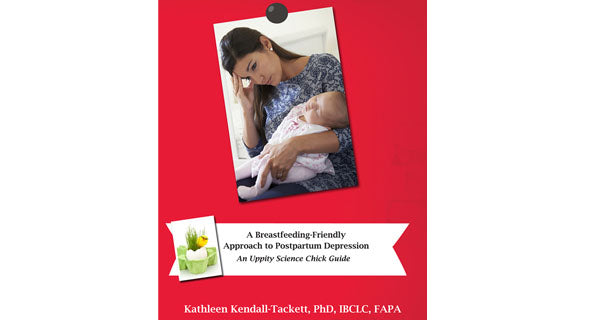 Moms who experience postpartum depression or anxiety while breastfeeding sometimes hear from their health-care providers that they'll have to wean in order to feel better, or even that breastfeeding causes depression. But a growing number of health care providers want to provide care for postpartum depression that is supportive of breastfeeding.
Moms who experience postpartum depression or anxiety while breastfeeding sometimes hear from their health-care providers that they'll have to wean in order to feel better, or even that breastfeeding causes depression. But a growing number of health care providers want to provide care for postpartum depression that is supportive of breastfeeding.
That interest is what prompted Dr. Kathleen Kendall-Tackett’s to write her latest book, A Breastfeeding-Friendly Approach to Postpartum Depression: A Resource Guide for Health-Care Providers. Dr. Kendall-Tackett has authored more than 300 articles and 24 books on maternal depression, trauma, family violence and breastfeeding, including Depression in New Mothers and Breastfeeding Made Simple.
We asked Dr. Kendall-Tackett a few questions about this topic, and we hope you find her answers (below) useful.
For more information on this topic you can listen to our podcast interview with Dr. Kendall-Tackett on the topic of breastfeeding and antidepressants, and you may also be interested in our podcast with her on the topic of trauma from childbirth.
You say that your goal is that “no new mother is told [by a health care provider] that breastfeeding is causing her depression or that she must wean in order to recover.” You also say that mothers may be less likely to hear these things than they were in the past. Why is that?
A couple of reasons. First, I think the research is better. We can now show studies that demonstrate the importance of breastfeeding, and the lower rates of depression among breastfeeding mothers. Practitioners used to believe that breastfeeding caused depression. We now have research that totally refutes that. Breastfeeding problems can cause depression. That's why it's important to address them. But breastfeeding is protective and at least lowers mothers' risk. And if a breastfeeding mother becomes depressed, breastfeeding helps her recover and also protects her baby.
Another reason why things are improving is that mothers have more access to information. It used to be that mothers who were told to wean had to really hunt to find anything to refute that. Now they can send out a tweet or search on Google. Of course, they can also find plenty of bad information out there. But it's easier to find the good information than it's ever been, and that empowers mothers.
Some mothers believe that taking anti-depressant medication while breastfeeding is more harmful than not treating their depression. How do you weigh these two choices?
I'd say a couple of things. First, there are serious consequences for both mother and baby of not treating depression. It is harmful to the mother's health (especially in terms of heart disease and diabetes). It can also harm babies who are affected by their mothers' mental health. If a woman becomes pregnant while depressed, she is at increased risk for having a preterm baby.
Second, most antidepressants are compatible with breastfeeding. Some (such as Zoloft, Paxil, and Lexapro) have only trace amounts in the milk and almost undetectable amounts in the baby's plasma. Babies are unlikely to be affected by something that is there in only tiny amounts.
Third, mothers don't need to choose between either treating with medications vs. not treating. There are lots of non-drug methods for treating depression, such as psychotherapy, omega-3s, exercise, acupuncture, and St. John's wort. So mothers always have other options.
You wrote this book for use by health care providers. What is the one thing you most wish health care providers knew about breastfeeding that you think most don't know now?
A couple of things here too. That breastfeeding is important to mothers and should not be discarded lightly. There will be times when weaning is the right choice for a mother. But I think sometimes that health care providers assume that it is always the right choice. It isn't. We need to find out what the mother wants to do and not be so quick to “give her permission to wean.” Some mothers experience that as pressure to wean.
Breastfeeding can also help mothers recover from depression. It helps lower their stress levels and improves their sleep. It also helps mothers maintain their relationships with their babies. So again, we need to always find out what the mother wants to do. If she is interested in continuing, we should support her.



